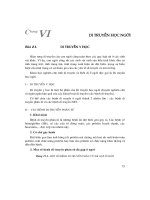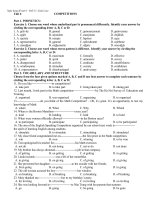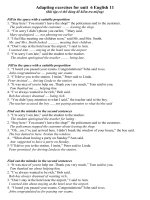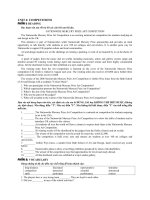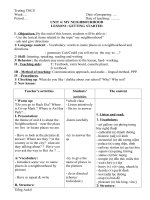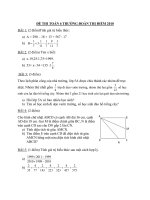Unit 6 SGK 11 thi diem
Bạn đang xem bản rút gọn của tài liệu. Xem và tải ngay bản đầy đủ của tài liệu tại đây (178.98 KB, 13 trang )
<span class='text_page_counter'>(1)</span>Date of preparation: January 2nd Distributive period: 54. Date of signing: January 4th Date of teaching:. Unit 6 global warming Lesson 1 Getting started. A. Objectives: 1. Language focus - To help learners get started with some language items in Unit 6 - For vocabulary, that is words and phrases related to global warming - For pronunciation, that is intonation in yes-no question and echo-question - For grammar, that is perfect gerunds and perfect participles 2. Skills - To help learners get started with 4 skills in Unit 6 - Reading: Skimming and scanning about global warming - Speaking: Expressing opinions, agreements, or disagreements - Listening: Listening for gist and specific information about global warming - Writing: Write an essay about global warming 3. Attitudes - To help Ss get started for Unit 6 with the topic "global warming" - To provide Ss some motivation B. Preparations: - Teacher: Handouts, textbook, lesson plan, pieces of papers and cassette. - Students: Textbook C. Methods: - The whole lesson: Integrated, mainly communicative. D. Procedures: Time/Stages Activities 1. Warm up 5 minutes 2. New lesson 10 minutes. 12 minutes. Lead in - Ask Ss listen to answer some questions to lead Ss to the lesson. - Ask Ss to guess the content of the conversation Activity 1: Listen and read - Tell Ss that they are going to listen to a conversation between Mai, Ms Hoa and Minh. - Play the recording - Ask Ss listen to the recording and read the conversation. - Explain new words if necessary - Ss listen and read the conversation, take notes new word - Ask Ss to look at the picture and answer the question - Who do you see in the picture? - Where do you think they are? - What are they doing? carbon print-foot infectious disease heat-related illnesses Activity 2: Read the conversation again and answer the questions.. - Ask Ss to work individually and finish the task - Ask them to exchange their answers with a partner. - Check their answer, ask them to give evidences for the answer Keys: 1. Global warming 2. Three parts: the causes, the effects, the solutions 3. Greenhouse gas emissions from factories and vehicles; use of chemical fertilizers, and deforestation. 3. Greenhouse gas emission, use of chemical fertilizers,. Interactions T <--> Ss T <--> Ss. Whole class. Individually. T <--> Ss.
<span class='text_page_counter'>(2)</span> 10 minutes 5 minutes. deforestation 4. Climate changes, infectious and heat-related diseases, impact on water supplies, threat to food production and upset ecological balance 5. They should change their daily habits 6. Causes: burning of fossil fuels, using of non-environment friendly products Effects: natural disasters such as floods, droughts, tsunami, acid rain Activity 3: Read the conversation again match the words and definition. - Ask Ss to read the conversation again, work in pairs, do the task Keys: 1. C 2. G 3. D 4. B 5. A 6. E 7. H 8. F Activity 4: Find the sentences with the structure having. Pair work T <--> Ss. Ved2. 3.. Consolidation. 2 minutes 4. Homework 1 minute. - Ask Ss to do the task. - Keys: Having planned Having contributed Having treated - Ask Ss: What have you learnt today? What can you do now? - Summarize the main points of the lesson. - Ask Ss to learn by heart the words or phrases related to the global warming. - Talking about what we should do to prevent global warming.. T <--> Ss. T <--> Ss T <--> Ss. E. Experience: ......................................................................................................................................................................................... ......................................................................................................................................................................................... .......................................................................................................................................................................................... Date of preparation: January 2nd Distributive period: 55. Unit 6 Lesson 2. Date of signing: January 4th Date of teaching:. global warming Language. A. Aims and Objectives: 1. Language focus - To provide learners some language items in Unit 6 - For vocabulary, that is words and phrases related to global warming - For pronunciation, that is intonation in yes-no question and echo-question - For grammar, that is perfect gerunds and perfect participles 2. Skills - To promote Ss to develop the skill of working in pairs and groups 3. Attitudes - To encourage Ss to work harder - To provide Ss some motivation B. Preparations: - Teacher: Handouts, textbook, pieces of papers, lesson plan and cassette. - Students: Textbook C. Methods: - The whole lesson: Integrated, mainly communicative. D. Procedures: Time/Stages 1. Check up. Activities. - Ask some Ss to talk about the causes, the effect of and solution to. Interactions.
<span class='text_page_counter'>(3)</span> 3 minutes. global warming. - Take notes and give feedback. 2. New lesson A. Vocabulary: Activity 1: Complete the sentences with the right form of the 6 minutes. 7 minutes. T <--> Ss. words/phrases. - Ask Ss to work individually first and then in pairs to do the task. - Ask Ss to do the tasks and compare the results with their partner * Keys: 1. carbon footprint 2. infectious diseases 3. emissions 4. ecological balance 5. heat-related illnesses 6. climate change 2. Pronunciation. Pair work. T <--> Ss. Intonation. 14 minutes. Activity 1: Listen and repeat. Pay attention to the intonation - Play the recording and let Ss listen - Play it again with pauses for them to repeat each word - Do as appointed - Pay attention to the intonation Activity 2: Listen and mark the symbol of rising intonation - Ask Ss to read the word in rows paying attention to the intonation. - Ask Ss to do the task then compare the answer with their partner - Play the recording and let Ss listen and read chorally. - Ask Ss to listen to the sentences and practice reading them correctly - Invite some Ss to read these sentences in front of the class and correct mistakes, if there are any. 2. Grammar:. Whole class. Pair work. a. Perfect participles in clauses of time and reason Activity 1: Underline the perfect participles in the sentences. 12 minutes. - Ask Ss to read the blue box and review the use and structure of the perfect participles. - Ask Ss to do the task then compare the answer with their partner * Keys: 1. Having planned After we have planned the content … 2. Having treated Because/Since humans have treated the …. The perfect participle is used to express a reason Activity 2: Match the two parts to make complete sentences -Let Ss finish the task and compare their answers with their partner's * Keys: 1. e 2. c 3. a 4. b 5. g 6. h 7. f 8. d. T <--> Ss. Individually. T <--> Ss. b. Perfect gerunds Activity 3: Rewrite the sentences, using the passive voice. - Ask Ss to work individually first, then in groups and check their answers.. Individually.
<span class='text_page_counter'>(4)</span> 3. Consolidation. 2 minutes. 4. Homework 1 minute. Keys: 1.The students in group 11G were praised for having planted the most trees in the schoolyard in the Tree Planting Competition 2. The police suspected Mike of having cut down the oldest tree in the park 3. He denied having dumped lots of rubbish onto the beach 4. Thank you for having saved the lives of hundreds of wild animals 5. They regretted having hunted and killed many wild animals 6. The factory was heavily fined for having dumped tons of toxic waste into the river 7. Denis was rewarded for having taken an active part in the Green Summer activities - Ask Ss: What have you learnt today? What can you do now? - Summarize the main points of the lesson. - Vocabulary related to the global warming - Perfect participles and perfect gerunds. - Intonation - T asks Ss to do exercises again at home. - Prepare for the next lesson. - Complete Exercises in workbook.. Group work T <--> Ss. T <--> Ss. T <--> Ss. E. Experience: ......................................................................................................................................................................................... ......................................................................................................................................................................................... .......................................................................................................................................................................................... Date of preparation: January 2nd Distributive period: 56. Unit 6. Date of signing: January 4th Date of teaching:. global warming Lesson 3 Reading. A. Aims and Objectives: 1. Language focus - To provide learners some vocabulary related to the global warming. 2. Skills - To promote Ss to develop their reading skills - Skim the text to get the general idea - Scan the text to get some specific details 3. Attitudes - To encourage Ss to work harder - To provide Ss some motivation B. Preparations: - Teacher: Handouts, textbook, pieces of papers, lesson plan and cassette. - Students: Textbook C. Methods: - The whole lesson: Integrated, mainly communicative. D. Procedures: Time/Stages Activities 1. Homework 8 minutes. - Ask some Ss to distinguish perfect participles and perfect gerunds and do the tasks again. 2. New lesson. Activity 1 Work with a partner and guess what problems are described in the pictures. - Discuss with a partner. Interactions T <--> Ss Pair work.
<span class='text_page_counter'>(5)</span> 12 minutes. - Let Ss work in pairs, do the task Suggested answers: - pollution - forest destruction Activity 2: Read the text and select the statement that. T <--> Ss. expresses main idea. 8 minutes. - Let Ss read the three heading a, b, c d first and make sure they understand all of them - Ask Ss to read through the text once without stopping at the words that they don't know the meaning - Ask them to work in pairs to decide on the best title for the text that gives the general idea of the whole text - Help them eliminate the choice that is only one aspect of the text * Keys: The best title of the text is "Global warming is mainly caused by humans and has negative impacts on people’s lives". Pair work. T <--> Ss. Activity 3: Match the words with their meanings. 14 minutes. - Ask Ss to do the task then compare the answer with their partner Keys: 1. G 2. F 3. D 4. E 5. B 6. A 7. C Activity 4: Answer the questions - Put Ss in groups of 3, ask them to read the questions first to make sure they understand them by asking them to underline key words - Let Ss read the text again and locate the parts of the text where they can get the answers * Keys: 1.We are responsible 2. It releases a large amount of carbon dioxide into the atmosphere 3. Deforestation disrupts the process of absorbing and capturing C02 from the atmosphere 4. They could lose their home 5. They can reduce crop harvest globally 6. Because human beings cannot exist without species diversity on earth Activity 5: Work in groups, discuss the question - Put Ss in groups of four and let them discuss the questions freely. Group work. T <--> Ss. Group work 3.. Consolidation. 2 minutes 4. Homework 1 minute E. Experience:. - Summarize the main points of the lesson - Vocabulary related to helping people with disabilities - Reading skills: skimming, scanning, guessing the meaning of new words/phrases through context - Ask students to learn by heart the new words. - Prepare for the next lesson.. Date of preparation: January 2nd Distributive period: 57. T <--> Ss. T <--> Ss. Date of signing: January 4th Date of teaching:. Unit 6 global warming Lesson 4 Speaking. A. Aims and Objectives: 1. Language focus - To provide learners some vocabulary related to the topic of global warming - To instruct learners how to express opinions, agreements or disagreements about solutions to global warming 2. Skills - To promote Ss to develop their speaking skills - To help Ss develop the skill of working in pairs and groups.
<span class='text_page_counter'>(6)</span> 3. Attitudes - To encourage Ss to work harder - To provide Ss some motivation B. Preparations: - Teacher: Handouts, textbook, lesson plan and pieces of papers. - Students: Textbook C. Methods: - The whole lesson: Integrated, mainly communicative. D. Procedures: Time/Stages Activities 1. Check up 8 minutes. - Ask Some Ss to go to the board and do the tasks again - Feedback. 2. New lesson. Activity 1: Work in pairs, in your opinion, which of the. 14 minutes. Interactions T <--> Ss. following activities in the table below can help to reduce global warming?. - Ask Ss to work in pairs, do exercise - Encourage Ss to explain their choice - Ask Ss to work by themselves, do the task then share their answer with their partner *Key: 1, 2, 4, 5, 6 Activity 2: The table below presents the reasons why the. Individually. T <--> Ss. activities in 1 can help reduce global warming. Match them with the activities. 10 minutes. - Put Ss in pairs, ask them to ask and do the task - Let Ss read the text again and locate the parts of the text where they can get the answers. * Keys: 1. e 2. b 4. c 5. a 6. d Activity 3: Lan, Mai and Minh are talking about the activities. Pair work. T <--> Ss. presented in 1. Work in groups of three. Complete the conversation using the phrases in the box and then practice it. 10 minutes. - Ask Ss to work in pairs, do the task. - Do as appointed - Let Ss work in pairs and do the task Keys: 1. energy use 2. electronic devices 3. planting trees 4. carbon dioxide 5. reusing and recycling Activity 4: What do you think about these solutions to global. Pair work Ss <--> Ss. warming? Work in groups of three. Use the idea in 1 and 2 to have a similar conversation. - Ask Ss to do the task - Summarize what they have learnt by asking Ss some questions: Consolidation What have you learnt today? What can you do now? 2 minutes - Vocabulary related to global warming - Speaking skills: making a conversation based on the sample 4.Homework - Vocabulary related to global warming 3.. T <--> Ss.
<span class='text_page_counter'>(7)</span> 1 minute. - Speaking skills: making a conversation based on the sample - Do the tasks again - Read Unit 6 - Listening at home. T <--> Ss. E. Experience: ......................................................................................................................................................................................... ......................................................................................................................................................................................... ......................................................................................................................................................................................... .......................................................................................................................................................................................... Date of preparation: January 2nd Distributive period: 58. Unit 6. Date of signing: January 4th Date of teaching:. global warming Lesson 5 Listening. A. Aims and Objectives: 1. Language focus - To provide learners some vocabulary related to global warming 2. Skills - To promote Ss to develop their listening skills - To help Ss develop the skill of working in pairs and groups 3. Attitudes - To encourage Ss to work harder - To provide Ss some motivation B. Preparations: 1. Teacher - Teaching aids: Textbook, lesson plan and cassette - Teaching method: Communicative language teaching 2. Students - Read through English Unit 6 - Listening at home C. Methods: - The whole lesson: Integrated, mainly communicative. D. Procedures: Time/Stages Activities - Ask some Ss to go to the board and talk about how to reduce 1. Check up global warming 7 minutes - Feedback 2. New Task 1: lesson a. Match the words with the pictures and answer the question - Ask Ss to work in pairs and do the task 13 minutes Suggested answers: 1. c (drought) 2. d (flood) 3. a (famine) 4. e (water shortage) 5. b (forest fire). Interactions T <--> Ss Pair work. T <--> Ss. b. What is the common cause of all the disasters depicted in the pictures above?. 12 minutes. - climate change - global warming - human being’s interference with the environment Task 2: Prof Linn is talking to a class of grade 11 students about global warming. Listen to the talk and choose the best answers. Pair work.
<span class='text_page_counter'>(8)</span> 10 minutes. - Have Ss listen to the CD for the first time and try to note down the information that helps them to check their answers - Ask Ss to share with their friends to see if they have the same answers or not - Let Ss listen to the CD for the second time and try to note down information they didn’t understand for the first time - Elicit answers from Ss and ask them to give clues to their answers - Let Ss listen again and pause at certain places if necessary to help Ss hear the information they need. *Key: 1. D 2. B 3. B 4. C 5. A Task 3: Listen to the talk again and answer the questions - Let Ss work in pairs to answer the questions. - Play the tape twice - Let Ss listen to the recording, do the task then compare the answer with their partner - Elicit Ss’ answers and give them the correct ones. Keys: 1. Carbon dioxide, carbon monoxide 2. The thick layer of the greenhouse gases traps more heat from the sun leading to the increase of the temperature on the earth 3. Heat waves, floods, droughts and storm surges. 4. Famine, water shortages, extreme weather conditions and a 2030% loss of animal and plant species. 5. When you have a lot of information about the topic, you’ll be more willing to change your lifestyle and you’ll be able to inform others and inspire change. Task 4: Work in groups. Discuss if the weather patterns in VN. T <--> Ss. Pair work. T <--> Ss. Pair work. T <--> Ss. have changed over the last ten years . Provide some examples. Then report the results to the class. - Ask Ss to listen again and do the task then compare the answer with their partner - Do as appointed 3. - Ask Ss to consolidate the main contents. Consolidation - Ask Ss: What have you learnt today? 2 minutes What can you do now? 4.Homework - Vocabulary related to the topic of global warming 1 minute - Do the tasks again - Prepare for the next lesson.. T <--> Ss T <--> Ss. E. Experience: ......................................................................................................................................................................................... ......................................................................................................................................................................................... .......................................................................................................................................................................................... Date of preparation: January 2nd Distributive period: 59. Date of signing: January 4th Date of teaching:. Unit 6 global warming Lesson 6 Writing.
<span class='text_page_counter'>(9)</span> A. Aims and Objectives: - To teach Ss to write an essay about the causes, effects and possible solutions to global warming. - To teach Ss to develop ability to think in a logical way to form a well-structured text. - By the end of the lesson, students will be able to: + Write an essay about the causes, effects and possible solutions to global warming. + Develop the writing skills in general. Build up vocabulary supported for writing. B. Preparations: - Teacher: Handouts, textbook, lesson plan and pieces of papers. - Students: Textbook C. Methods: - The whole lesson: Integrated, mainly communicative. D. Procedures: Time/Stages Activities Interactions 1. Check up - Ask some pairs of Ss to talk about causes and effects of global 5 minutes T <--> Ss warming 2. New lesson 9 minutes. 10 minutes. Task 1: Which are the causes and which are the effects of global warming? Complete the diagram with the idea below.. - Ask Ss to work in pairs and do the task - Set a time limit for this activity and assist Ss if necessary Keys: Causes: 2, 4, 7 Effects: 1, 3 6, 8 5 9 Task 2: Work in pairs, discuss and complete the outline using. T <--> Ss. Pair work. the ideas from 1. Brainstorm some possible solutions. 18 minutes. - Ask Ss to do the task, then compare the result with their partner. - Draw Ss’ attention to the instructions and questions - Get Ss to work individually to find the answer - Ask them to practice in pairs - Call on a few Ss to report the answers 1. Introduction (introduce topic and the main contents) - one of the biggest issues facing humans nowadays - caused mainly by humans - most catastrophic effects on humans - humans have to take actions to reduce the risks - the essay will discuss the causes and effects, and possible solutions 2. What global warming is and its cause - the rise in the average temperature of the earth due to the increase of greenhouse gases in the atmosphere - causes Carbon dioxide emission Deforestation for farming land Increasing use of chemical fertilizers on cropland 3. Effects of global warming - heat related diseases and death, and spread of infectious diseases - melting of polar ice caps and rising of sea levels - extreme weather patterns such as severe storm, heat waves, floods and droughts - widespread extinction of species 4. Some possible solutions - reduce energy use - planting trees or plants. T <--> Ss. Individually. T <--> Ss.
<span class='text_page_counter'>(10)</span> - Using green methods of transportations Task 3: Write your essay using the helpful expressions in the box. - Ask Ss to do the task - Draw Ss’ attention to the instructions. - Point out to Ss how to write an essay. - T goes around and gives help, collects common mistakes for later correction. - Collect 5 stories to mark in class so that all Ss feel the need to do the task. - Walk around and offer help if necessary. - Get students' answers and comments. - Get some outputs to highlight and comment and correct the possible mistakes of students. - Give feedback on these papers To begin with: The deforestation for farmland, wood and paper contributes to higher temperatures which lead to the melting of polar ice caps and rising of sea levels 3. - Ask Ss to consolidate the main contents. Consolidation - Ask Ss to complete the writing at home and collect 2 minutes - Ask Ss: What have you learnt today? What can you do now? 4.Homework - Write the text again at home. 1 minute - Prepare for the next lesson.. Individually. T <--> Ss. T <--> Ss. T <--> Ss. E. Experience: ......................................................................................................................................................................................... .......................................................................................................................................................................................... Date of preparation: January 2nd Distributive period: 60. Unit 6 Lesson 7. Date of signing: January 4th Date of teaching:. global warming Communication and culture. A. Aims and Objectives: - To teach Ss about a global warming problem. - To teach Ss to talk and read about Young voices for the planets. - To provide learners some communication samples and cultural items - To promote Ss to develop their communication skills and cultural understanding - To help Ss develop the skill of working in pairs and groups - By the end of the lesson, students will be able to: + Understand and read about a global warming problem. + Talk about about Young voices for the planets. + Get knowledge of Young voices for the planets. B. Preparations: - Teacher: Handouts, textbook, lesson plan and pieces of papers. - Students: Textbook C. Methods: - The whole lesson: Integrated, mainly communicative. D. Procedures: Time/Stages Activities - Inform the class of the lesson objectives: Further skill development 1. Warm up 5 minutes 2. New 1. Communication:. Interactions T <--> Ss.
<span class='text_page_counter'>(11)</span> lesson 12 minutes. 25 minutes. Green teen club is a youth organization whose purpose is to protect the environment. Prepare a talk about one main cause of global warming and present in the club meeting.. Group: Good morning everybody, Chi: Today we are very happy to be here and give you our presentation. We are going to talk about one main cause of global warming. There are three main parts in our speech today. Lan will start with the main cause of global warming. Then, Nam continues with some effects of global warming. And Trang will finishes with some solutions to the problem. So now Trang, could you tell us about the main reason for global warming Trang: Well, I think that the emission of carbon dioxide into the atmosphere is the main cause of this problem. As you know, carbon dioxide can retain the heat from the sun, so the more carbon dioxide there is in the atmosphere, the hotter our earth. Chi: Thank you Trang. And what are the effects of this problem. Nam, do you know? 2. Culture: Young voices for the planets Activity 1: Read the paragraph about how youth can contribute to reducing the risk of global warming and answer the questions. - Read the two passage and answer the questions. - Ask Ss to work in pairs and do the task. - Ask several pairs to ask and answer the questions. Suggested answers: 1. It is a series of short films that tell real stories about the different ways young people have contributed to reducing the carbon footprint of their homes, schools, communities and countries. 2. Because he has learned about how trees can help to reduce the amount of carbon dioxide in the atmosphere 3. To raise money for the clean-up of the BP oil spill in the Gulf of Mexico in 2010. 4. One student stood covered in plastic bags in front of city lawmakers and asked them to ban plastic bags Activity 2: What do young Vietnamese people do to reduce the carbon footprint. - Ask Ss to read the text and groups to do the task - Ask Ss to do as appointed 3. - Ask Ss to consolidate the main contents. Consolidation - Ask Ss: What have you learnt today? 2 minutes What can you do now? + Talk about International day for persons with disabilities. 4.Homework - T asks Ss to learn the structures and vocabulary. 1 minute - Prepare for the next lesson.. Pair work T <--> Ss. Group work. T <--> Ss. Pair work. T <--> Ss. Pair work T <--> Ss. T <--> Ss. T <--> Ss. E. Experience: ......................................................................................................................................................................................... ......................................................................................................................................................................................... .......................................................................................................................................................................................... Date of preparation: January 2nd. Date of signing: January 4th.
<span class='text_page_counter'>(12)</span> Distributive period: 61. Unit 6 Lesson 8. Date of teaching:. global warming Looking back and project. A. Aims and Objectives: - To help Ss pronounce revise what they have learned in unit 6. - To teach Ss some lexical items related to global warming - To give them a chance to do a small project in which they can develop their speaking skills - To promote Ss to develop their communication skills and cultural understanding - To help Ss develop the skill of working in pairs and groups - By the end of the lesson Ss are able to: + Use the intonation in connected speech correctly. + Use some key words of the topic global warming + Do the exercises on perfect participles and perfect gerunds B. Preparations: - Teacher: Handouts, textbook, pieces of papers, lesson plan and cassette. - Students: Textbook C. Methods: - The whole lesson: Integrated, mainly communicative. D. Procedures: Time/Stages Activities Interactions * Checking 1. - Ask some Ss to go to the board talk about International day for Homework persons with disabilities T <--> Ss 5 minutes - Feedback. - Speak out their ideas and opinions, knowledge that they have learnt in Unit 4. 2. New Pronunciation: lesson Activity 1: Listen and repeat the questions paying attention to Individually the rising intonation 10 minutes - Ask Ss to listen to the rising intonation. 12 minutes. - Ask Ss read the exchanges and do the task - Ask Ss to check their answer with other classmates - Elicit answers from the whole class - Let Ss listen again and pause to help them to notice the elision. Activity 2: Listen and mark the rising intonation - Play the recording and let Ss listen and do the task. - Play the CD once and ask S to check their answers. - Let them listen again if necessary - Ask Ss to check their answer with other classmates - Elicit answers from the whole class Vocabulary: Activity 1: Complete these sentences using the words given in the box. 15 minutes. - Let Ss do this vocabulary exercise in pairs or groups of 4 - Ask Ss to work on their own first. - Then ask Ss to compare answers with a partner to see if they have the same answer - After that, elicit answers from the whole class and correct the wrong ones *Keys: 1. energy use 2. extinction 3. emissions 4. carbon footprint 5. absorb. T <--> Ss Group work. T <--> Ss. Pair work T <--> Ss.
<span class='text_page_counter'>(13)</span> 6. deforestation 7. diversity 8. catastrophic Grammar: Activity 1: Rewrite the sentences using perfect participles - Ask Ss to work individually and then exchange with others *Key 1. Having learnt about the benefits …, the students … 2. Having refused Nam’s offer of a lift in his car, Mai had to … 3. Having read some documents about Green Earth 4. Having used too much chemical fertilizer on their farm, the farmers … 5. Having replaced all the light bulbs …, she saved 6. Having become too dependent on the use of electricity. Activity 2: Combine the sentences using the perfect gerund - Ask Ss to work in groups and do the task. *Keys 1. Tony was strongly criticized for having dumped … 2. Sam regretted not having worked hard enough … 3. People admire Tony for having rescued the … 4. I remember having seen him before 5. The politician denied having lied to the villagers 6. Thanh admitted having forgotten … Project: 1.Work in groups. Discuss which of the following activities your group can do to help reduce the carbon footprint. Individually. T <--> Ss. Group work. T <--> Ss. - Ask Ss to do the task 2. Give your group’s activities and campaign name and think about its purposes.. 3. Consolidation. 2 minutes. 4.Homework 1 minute. - Let the groups do the task in their free time. - Ask Ss to consolidate the main contents. - Ask Ss: What have you learnt today? What can you do now? Expected answer: Learn more about: - The intonation - Revise what Ss have learnt in unit 6 - Talk about how to reduce carbon footprint - Vocabulary related to the topic of global warming - T asks Ss to learn the structures and vocabulary. - Revise what Ss have learnt in unit64. - Do the tasks again. - Prepare for the next lesson.. T <--> Ss. T <--> Ss. E. Experience: ......................................................................................................................................................................................... ......................................................................................................................................................................................... ......................................................................................................................................................................................... ......................................................................................................................................................................................... ..........................................................................................................................................................................................
<span class='text_page_counter'>(14)</span>
